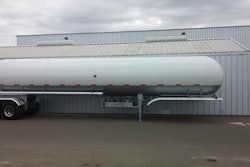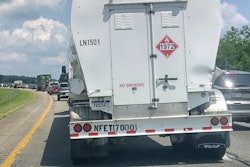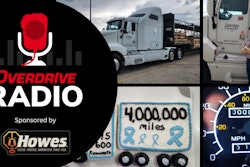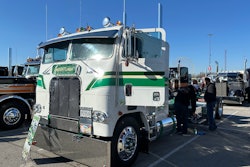Updated Tuesday, Sept. 5: Despite calls for an extended comment period from the Commercial Vehicle Safety Alliance and others, the deadline to comment on the joint proposal seeking feedback on a proposal to mandate automatic emergency braking systems on heavy-duty trucks from the Federal Motor Carrier Safety Administration and the National Highway Traffic Safety Administration is tonight, Tuesday, Sept. 5, at 11:59 p.m. Eastern. Comments to NHTSA can be made here, while comments to FMCSA can be made here.
CVSA, which is filing its comments Tuesday on behalf of the Commercial Vehicle Brake Manufacturers Council (CVBMC), said that while it supports the intent of the proposal, it found “a number of challenges with the proposed implementation, testing procedures and timeline that should be addressed prior to the agencies publishing their final rules.”
One primary issue, CVSA said, is that the proposal and its testing procedures were written to reflect AEB as a crash prevention technology rather than a crash mitigation technology. The group noted, however, that AEB developers designed AEB to alert drivers to a potential crash and to help the driver respond, if necessary; not to actually prevent crashes. “Many of the testing procedures and performance standards appear to be crafted for AEB as a prevention tool, rather than a mitigation tool, and this disconnect must be addressed.“
The group also noted challenges in Class 3-6 trucks, as electronic stability control systems and AEB are not readily available in the medium-duty truck space, which will require more time to deploy and implement the technology than the proposal outlines.
“The final AEB rule must consider the many differences in vehicle types, vocation, performance, application, readiness to incorporate ESC and AEB by type and class, along with the costs and time needed to conduct development, testing and certification of these vehicle systems,” the group said. It added that the CVBMC would file additional comments to outline and propose alternate performance and test requirements.
Original story follows:
As more automated-driving capabilities have steadily been featured on newer trucks, owners have for many years shared various instances of so-called “false positive” events -- where collision-detection/warning systems key in on objects ahead that no human driver would see as an insurmountable problem. While there's certainly a learning curve when it comes to operating with such systems in place, the result of various "false positive" events, a sudden application of the brakes, has unnerved many.
Among them is owner-operator Daniel Bolander of Dunnville, Kentucky. He’s the owner of a 2022 and two 2023 Western Star 49X models, outfitted with collision warning and active braking technology. He’s at the end of his rope with false positives, he said, speaking earlier this week.
“I had it happen to me just the other day,” he said. With a free and clear highway ahead on the road home, “that truck would downshift and put the engine brake on, like it saw a ghost or something.”
He rattled off several other instances. Coming out of Savannah, Georgia, northbound, “they were working on the right lane,” he said, and had moved the freeway lanes into the left lane and median. Approaching the lane shift, “man, the truck saw the barriers and locked the brakes up.”
On a two-lane road near where he lives in Kentucky, then, following a concrete truck “headed to Bowling Green to a dealer,” the concrete truck navigated a right-hand bend in the road, and another vehicle coming the other way then appeared. Bolander’s truck’s collision detection keyed in on that vehicle, he said, and “it slammed the brakes on me.”
Approaching an intersection in another instance, a car moved into the right-hand turn lane ahead of him, slowing considerably, yet not in front of his own truck. That resulted, Bolander said, in yet another false positive -- and a stiff brake application.
But the worst such instance for Bolander's company happened over Memorial Day weekend with his son-in-law behind the wheel and pulling a flatbed load of big structural pieces meant for a roadside billboard installation: a big, round steel tube and multiple long pieces of three-inch angle iron, all strapped to four-by-fours on the deck. Approaching Cincinnati on I-75 in an area where the left lane disappears, as vehicles merged right up ahead “the dash lit up with a collision warning and it locked up on him.
“The load slid forward on the four-by-fours,” some of the wood underneath rolling forward, Bolander believes, “and all the straps loosened up,” he said. This was the result:
 Angle-iron pieces knocked small holes in the sleeper, as shown. His son-in-law was “lucky he wasn’t killed,” Bolander said.Daniel Bolander
Angle-iron pieces knocked small holes in the sleeper, as shown. His son-in-law was “lucky he wasn’t killed,” Bolander said.Daniel Bolander
As regulators at the National Highway Traffic Safety Administration and Federal Motor Carrier Safety Administration enter the process of acting on Congress’ direction to mandate automatic emergency braking for new trucks, Bolander’s not the only one who sees the technology as, at the very least, not exactly ready for such a prime time follout.
NHTSA itself, prior to issuing its notice of proposed rulemaking seeking to mandate AEBs on heavy trucks, opened an investigation into an estimated 250,000 Freightliner and Western Star trucks equipped with AEB systems, responding to complaints filed to the agency regarding so-called “false-positive” braking events.
“Drivers report activation of the AEB without an actual roadway obstacle, also known as a false positive event,” NHTSA said when announcing the investigation. “The reports indicate the subject vehicle will apply the service brakes without warning or input from the driver. The applications range from momentary, partial application with little loss of speed to full application, which brings the vehicle to a complete stop in the travel lane.”
One thing that’s apparent when looking through public comments filed to the AEB proposal’s Federal Register docket is that it’s not the technology itself that many truck drivers are opposed to -- it’s how advanced the technology is, or isn’t.
Commenter Albert Beavers said he’s driven trucks with AEBs installed for the last five years and noted the duality of the technology -- “They are in some sense a great tool, [and] also a horrible, unexpected accident waiting to happen.” He said the technology operates well with clear, dry conditions with normal traffic. “But when there is blinding rain, freezing precipitation, a change in color of the pavement, a dark shadow from a bridge at 4 p.m., or a car cuts in front of you and slams on [the brakes] as it’s exiting of the highway, these systems are horrible.”
Beavers added that he believes installing the technology should be a choice left to the owners of the equipment rather than a government mandate. “We are already regulated to the point of being suffocated,” he said. “At least give us the choice of how to drive. It’s what we do for a living.”
Owner-operator James Frey told regulators in his comments the technology “needs to be perfected more before it’s implemented.” If AEBs get to a point of having no false-positive activations, Frey said he’ll reconsider, “but I find it very uncomfortable having a computer take over my truck -- especially in heavy traffic and/or with slippery road conditions.”
[Related: Old-school ways with new-school tools: Back to safety/efficiency basics with advanced assist systems]
False-positive braking can be dangerous enough in normal road conditions, but it’s even worse with snow or ice on the road, concurred commenter Harley Moore, who’s been behind the wheel of a truck for the last 27 years. One false-positive activation, he said, “had me moments from a wreck as I was on a slick highway in Pennsylvania in a snow storm, not blizzard conditions, just an average snow storm where the highways were starting to pick up a small amount of accumulation, enough to make hard braking dangerous to the other motoring public on the highway.”
Moore said that while AEBs are supposed to be a safety feature, those who have experienced false-positive braking events view safety as a cost of the technology.
“If you want safety, find a device that reads the travel speed of the vehicle ahead of the truck it is equipped on,” he added. “I believe that would be more safety-driven and beneficial to truck drivers on the highway, as many can't seem to see beyond their phones to know that the vehicle ahead of them may be slowing down. But to force every new truck to be equipped with any type of emergency braking equipment is actually setting the stage for a more dangerous roadway.”
Another concern, presented by commenter Daniel Feldman, is the presence of AEB systems on trucks hauling freight that sloshes or swings -- tankers not filled to capacity, or trailers loaded with swinging meats. “No attempt to evaluate [electronic stability control (ESC)] on these moving loads seems to have been performed,” he noted. “Sudden [braking] events that throw moving load inertia in unexpected directions can have dire consequences, even when the truck is in the hands of an experienced driver.”
Feldman said he’s not opposed to AEBs and similar systems, and believes they are a "must-have for future safe operations,” but he added that current systems “are unable to cope with dynamic loads, and I am concerned for drivers that must deal with sudden ill-advised maneuvers by their not-smart trucks.”
Even truck manufacturers are wary of mandating AEBs on trucks. The Truck & Engine Manufacturers Association, while joining the Commercial Vehicle Safety Alliance in requesting a 30-day extension on the comment period, said the proposal “presents numerous complex issues and technical challenges.” While ESC and AEB “are proven safety technologies for truck tractors,” EMA noted “they can present unintended negative safety consequences if they react too aggressively or activate when not needed. Careful balancing of the proposed standards is critical to ensuring the intended benefits of the technologies are achieved in use.”
As of now, without an extension of the comment period, NHTSA and FMCSA are accepting comments through Sept. 5. Comments to NHTSA can be made here, while comments to FMCSA can be made here.
[Related: CVSA asks for more time to comment on automatic emergency braking proposal]








